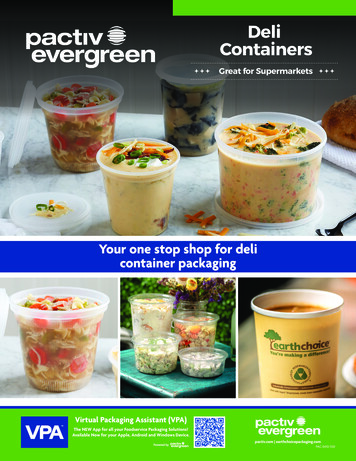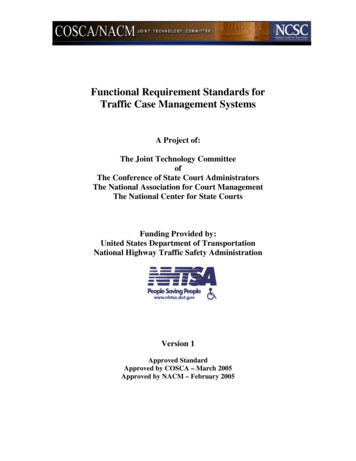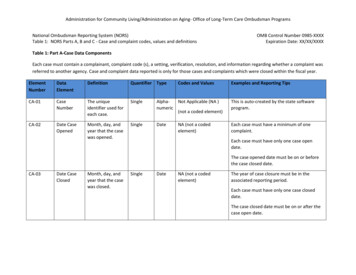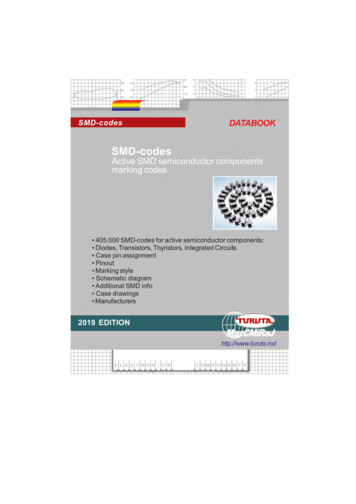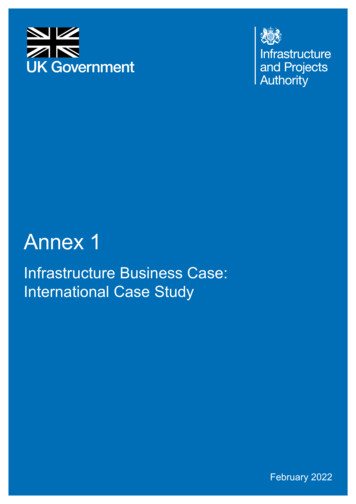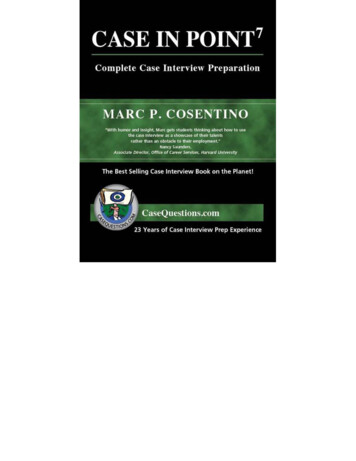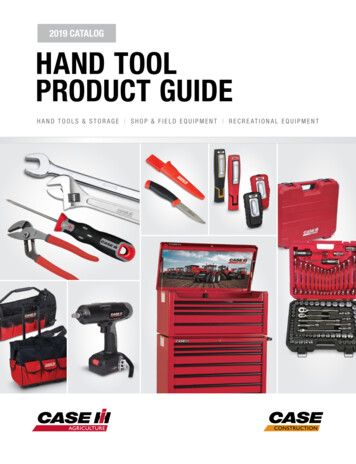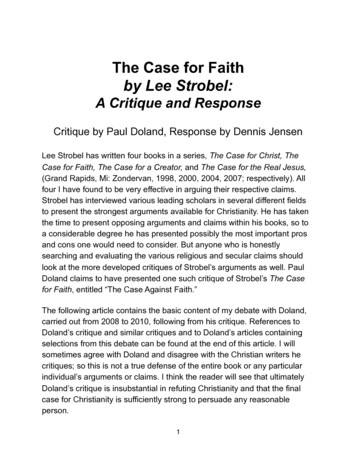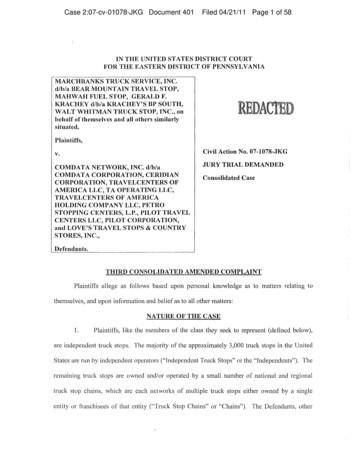
Transcription
Case 2:07-cv-01078-JKG Document 401Filed 04/21/11 Page 1 of 58IN THE UNITED STATES DISTRICT COURTFOR THE EASTERN DISTRICT OF PENNSYLVANIA. - -MARCHBANKS TRUCK SERVICE, INC.d/b/a BEAR MOUNTAIN TRAVI L STOP,MAHWAH FUEL STOP, GERALD F.KRACHEY d/b/a KRACHEY'S UP SOUTH,WALT WHITMAN TRUCK STOP, INC., onbehalf of themselves and all others similarlysituated,Plaintiffs,v.Civil Action No. 07-1078-.JKGCOMDATA NETWORK, INC. d/b/aCOMDATA CORPORATION, CERIDlANCORPORATION, TRAVEL CENTERS OFAMERICA LLC, TA OPERATING LLC,TRAVELCENTERS OF AMERICAHOLDING COMPANY LLC,PETROSTOPPING CEN'fERS, L.P., PILOT TRAVELCENTERS LLC, PILOT CORPORATION,and LOVE'S TRAVEL STOPS & COUNTRYSTORES, INC.,.JURY TRIAL DEMANDEDConsolidated CaseDefendants.THIRD CONSOLIDA'l'ED AMENDED COMPLAINTPlaintiffs allege as follows based upon personal knowledge as to matters relating tothemselves, and upon information and belief as to all other matters:NATURE OF THE CASE1.Plaintiffs, like the members of the class they seek to represent (defincd below),are independent truck stops, T'he majority of the approximately 3,000 truck stops in the UnitedStates are run by indepcndent operators ("Independent Truck Stops" or the "Independents"). 'rheremaining truck stops are owned and/or operated by a small number of national and regionaltruck stop chains, which are each networks of multiple truck stops either owned by a singleentity or lhmchisees of that entity ("Truck Stop Chains" or "Chains"). The Defendants, other
Case 2:07-cv-01078-JKG Document 401Filed 04/21/11 Page 2 of 58than Comdata Network, Inc. d/b/a Comdata Corporation ("Comdata") and its parent, CeridianCorporation ("Ceridian"), are all of the major multi-state Truck Stop Chains other than the Chainoperated by Flying .T, Inc. (the "Chain Defendants"). Flying.T is not a party to this action. Eachof the Chain Defcndants was composed of at least sixty truck stop locations at all relevant times,and all but one was composed of more than one-hundred separate locations at all relevant times.2.Trucking companies or fleets ("Fleets") contract with third parties to providetruck drivers with Heet payment cards ("Trucker Fleet Cards" or "Fleet Cards") to pay for dieselfuel and other items at truck stops aeross the country. Comdata is the dominant issuer of TruckerFleet Cards.This case arises out of Defendants' antieompetitive scheme involving, in part,agreements in unreasonable restraint of trade, in violation of Sections 1 and 2 of the ShermanAntitrust Act (the "Scheme").Defendants' Scheme had the intent and effect of illegallymaintaining and enhancing Comdata's monopoly power and market dominance.3.As a part of the Scheme, Comdata implemented a two-tier pricing system underwhich Comclata dramatically increased the transaction fees for processing Trucker Fleet Cards tothe Independent Truck Stops, while charging the Chain Defendants much lower fees, giving theChain Defendants a substantial competitive advantage visa vis the Independents.As a result ofthe anticompetitive Scheme alleged herein, Comdata succeeded in erecting artificial barriers tothe entry and expansion of rival Fleet Card issuers, thereby maintaining sufficient market powerto continue to charge its artificially inHated transaction fees profitably without losing marketshare to rivals.4.Trucker Fleet Cards are processed at truck stops on computerized point-of-saletransaction systems ("Fleet Card POS systems") specially designed for accepting and processing2
Case 2:07-cv-01078-JKG Document 401Trucker Fleet Card transactions.Filed 04/21/11 Page 3 of 58Comdata owns and operates the dominant Fleet Card POSsystem in the United States.5.Trucker Fleet Cards look like consumer credit cal'ds and similarly allow theirholders to make purchases without exchanging cash. But unlike other payment cards or systems,Trucker Fleet Cards provide speeial benefits to companies that operate trucks ("Truck Fleets" or"Fleets" or "Truckers"), including the ability to (a) transmit data at the point of sale that can beused to monitor the locations, fuel usages, and other key information (including informationrelating to state fuel taxes and the like) about individual trucks ("Data Capture"), and (b) limitthe types of items that truck drivers may purchase and amounts that may be spent ("PurchaseControls"). Long-haul Fleets travel long-distances and travel "over-the-road" typically throughmultiple states on interstate highways, in heavy-duty trucks on trips lasting days or weeks. Theunique Fleet Card features described above are specifically demanded by long-haul Fleets. ThePurchase Control and Data Capturef( aturesare a key reason why Trucker Fleet Cards and theFleet Card POS systems that process those cat'ds compete in markets distinct from other paymentcards (including consumer credit cards), methods, and systems.6.This case arises from Defendants' anticompetitive conduct in the markets for (i)Trucker Fleet Cards, (ii) Fleet Card POS systems, and (iii) Truck Stops. Comdata has monopolypower in thc markets for Trucker Fleet Cards and Fleet Card POS systems.The ChainDefendants are powerful players in the Truck Stops market. The Chain Defendants are alsoactual and potential rivals to Comdata in the Fleet Card market because the Chain Defendantshave the potential to provide Fleet Card services of their own, or to expand nascent Fleet Cardprojects to compete with Comdata.Indeed, Ceridian and Comdata themselves consider theChain Defendants as horizontal competitors.As Ceridian's February 2007 10-K states,3
Case 2:07-cv-01078-JKG Document 401Filed 04/21/11 Page 4 of 58"Comdata competes with truck stops and other service centers that offer similar products andservices."7.As more fully detailed below, Comdata abused its monopoly power in the FleetCard market and the Fleet Card POS systems markets by enlisting the Chain Defendants-whoare both Comdata's customers and Comdata's actual and potential horizontal competitors in theFleet Card market-to engage in the anti competitive Scheme alleged herein, which has includedthe following elements, among others:(a) Beginning in or about the year 2000, Comdata entered into in to a quid pro quo withthe Chain Defendants. Comdata imposed a two-tier transaction fee pricing scheme under whichthe Chain Defendants were charged a relatively low flat fee of under 1 per transaction, whilethe Chain Defendants' Independent rivals are saddled with a high percentage-based fee of around2% or more per transaction, which amounted to, at minimum, an effective 500-1000%differential in pricing. The two-tier pricing has put the Independents at a significant competitivedisadvantage relative to the Chain Defendants. In exchange, the Chain Defendants agreed toenhance and support Comdata's dominance in the Fleet Card Market by (i) refusing to accept therival TCH Fleet Card, (ii) agreeing not to issue Fleet Cards of their own or to promote or expandtheir own Fleet Cards in competition with Comdata, and (iii) agreeing to certain restrictivecontractual provisions designed to limit competition in the Fleet Card market.(b) Comdata entered into separate written agreements with each of the Chain Defendantsbeginning as early as 2001 that included a variety of contractual restrictions each of which,standing alone, was designed to, and did, maintain and enhance Comdata's monopoly power andmarket dominance, including provisions that, inter alia:4
Case 2:07-cv-01078-JKG Document 401(i)Filed 04/21/11 Page 5 of 58required the Chain Defendants to offer all Fleets in the Comdata "FuelNetwork" or carrying the Comdata Fleet Card a fuel discount that had to be at least as large asthe maximum discount the Chain extended to a Fleet in a rival "Fuel Network" using a rivalFleet Card (referred to herein as the "Fuel Discount Most Favored Nations" or "Fuel DiscountMFN" clause). This provision impaired the ability of rival Fleet Cards to offer Fleets overallfuel purchase costs lower than Comdata could offer to Fleets, despite the fact that Comdatacharged systematically higher transaction fees to the Independents and the Chain Defendantsthan did nearly all of its Fleet Card rivals;(ii) required the Chain Defendants other than Love's not to pay higher transactionfees to any Fleet Card issuer than it pays to Comdata (referred to as the "Transaction Fee MostFavored Nations" or "Transaction Fee MFN" clause). This provision effectively blocks the truckstop from accepting certain rival Fleet Cards with business models that impose higher fees (butoffer other advantages). When combined with other similar contractual restrictions, includingthe Fuel Discount MFN, the Transaction Fee MFN prevents rival Fleet Cards from competingwith Comdata for Fleet business, and discourages and restricts the growth of the ChainDefendants' own respective nascent Fleet Card businesses and in-house accounts;(iii) barred "active sales efforts" to convert Comdata Fleet Card holders to anyother Fleet Card network, including to one of the Chain Defendants' own Fleet Cards or in-houseaccounts.Given that Comdata was and is the dominant Fleet Card issuer held by the vastmajority of Fleets and Truckers, this restriction on converting customers severely impaired thegrowth of the Chains' own Fleet Cards and prevented and impaired efforts by Fleet Card rivals toencourage the Chain Defendants to promote rival fuel networks and Fleet Cards; and,5
Case 2:07-cv-01078-JKG Document 401Filed 04/21/11 Page 6 of 58(iv) prohibited the Chain Defendants from imposing surcharges on Comdatatransactions or steering truck stop customers (i. e., Fleets) to rival cards using financial incentivessuch as rebates or discounts. Comdata also required that its Fleet customers receive the lowestposted diesel fuel price at truck stops. These provisions, individually and collectively, insulatedComdata from transaction fee price competition, and thereby restricted competition in the FleetCard market by preventing the Chain Defendants from passing on the higher costs of Comdata' sFleet Cards and the lower costs of Comdata' s Fleet Card rivals.(c)Comdata imposed exclusionary and restrictive contractual provIsIOns on theIndependent Truck Stops, provisions which were, in large part, more onerous versions of manyof the provisions in the Chain Defendants' Comdata contracts as summarized in 7(b)(i)-(iv)above, including Fuel Discount and Transaction Fee MFN provisions, restrictions on convertingcustomers to rival Fleet Cards, and bans on steering, surcharging, and rebating.GivenComdata's market dominance and monopoly power, and the necessity to Independents ofcarrying the Comdata Fleet Card because of its predominance among Truckers and Fleets, theIndependents had no real choice but to accept the terms (and fees) that Comdata dictated.(d)Comdata imposed exclusionary loyalty provisions in its contracts with Fleets,including discounts conditioned on a Fleet's use of the Comdata Fleet Card for most or all Fleetpurchases.(e) Comdata programmed its dominant Fleet Card POS system so as not to facilitateprocessing of one significant rival Fleet Card issued by TCH (for example, by impairing the DataCapture and Purchase Control features), impeding TCH's ability to compete.8.Comdata and the other Defendants conspired to and did unreasonably restraintrade through the anticompetitive contractual provisions described above and other aspects of the6
Case 2:07-cv-01078-JKG Document 401Filed 04/21/11 Page 7 of 58Scheme. The Scheme maintained and preserved Comdata's monopoly power in the TruckerFleet Card market, and thereby maintained Comdata's ability to impose artificially inflated andexorbitant fees on the Independents.9.The anticompetitive conduct alleged herein constitutes an unlawful scheme andconspiracy to acquire and maintain monopoly power in violation of Section 2 of the ShermanAntitrust Act, 15 U.S.C. § 2. Each agreement in furtherance of Defendants' Scheme, includingthe quid pro quo and each contract containing any of the exclusionary provisions describedherein, constitutes an unreasonable restraint of trade in violation of Section 1 of the ShermanAntitrust Act, 15 U.S.C. § 1, as does the Scheme as a whole. The Defendants' conduct has hadthe purpose and effect of allowing Comdata to maintain and enhance its monopoly power andcharge supracompetitive prices to Plaintiffs and the proposed class of Independent Truck Stops,and otherwise to cause harm to competition more generally.JURISDICTION AND VENUE10.The claims set forth in this Complaint arise under Sections 1 and 2 of theSherman Act (15 U.S.C. §§ 1 and 2) and seek treble damages pursuant to Section 4 of theClayton Act (15 U.S.C. § 15(a)). In addition, Plaintiffs seek injunctive relief pursuant to Section16 of the Clayton Act (15 U.S.C. § 26). This Court has subject matter jurisdiction over theseclaims pursuant to 28 U.S.C. §§ 1331 and 1337(a).11.Venue is proper in the Eastern District of Pennsylvania under 28 U.S.c. § 1391(b)and 15 U.S.C. § 22 because (a) Defendants reside, transact business, committed an illegal ortortious act, have an agent, and/or are found in this District, (b) Plaintiff Walt Whitman TravelStop, Inc. operated its Independent Truck Stop in Philadelphia, PAin this District for a large partof the period relevant to this Complaint, and (c) a substantial portion of the events describedbelow have been carried out in this District.7
Case 2:07-cv-01078-JKG Document 401Filed 04/21/11 Page 8 of 58PARTIESPLAINTIFFS12.Plaintiff Marchbanks Truck Service, Inc. d/b/a Bear Mountain Travel Stop is anIndependent Truck Stop located in Bakersfield, California.During the Class Period definedbelow, Plaintiff Marchbanks Truck Service, Inc. accepted Trucker Fleet Cards issued byComdata, paid fees directly to Com data, and was injured by paying higher fees due to the illegalconduct described herein.13.Plaintiff Mahwah Fuel Stop is an Independent Truck Stop located at 131 StateRoute 17, Mahwah, New Jersey, 07430, and is incorporated in the State of New Jersey. Duringthe Class Period defined below, PlaintilT Mahwah Fuel Stop accepted Trucker Flect Cards issuedby Defendants, paid fees directly to Comdata, and was injured by paying higher fees due to theillegal conduct described herein.14.Plaintiff Gerald F. Krachey d/b/a/Krachey's BP South is an Independent TruckStop located at 1910 South Marquette Road, Prairie do Chien Wisconsin 53821. During theClass Period defined below, Krachey's BP South accepted Trucker Fleet Cards issued byComdata, paid fees directly to Comdata, and was injured by paying higher fees due to the illegalconduct described herein.15.Plaintiff Walt Whitman Truck Stop, Inc. was an Independent Truck Stop inPhiladelphia, Pennsylvania. During the Class Period defined below, Walt Whitman Truck Stop,Inc. accepted Trucker Fleet Cards issued by Comdata, paid fees directly to Comdata, and wasinjurcd by paying higher lees due to the illegal conduct described herein.DEI?ENDANTS16.Defendant Comdata Network, Inc. d/b/a Com data Corporation ("Col11data") is a\vholly owned subsidiary of Minneapolis-based Ceridian Corporation. Comdata, headquartered8
Case 2:07-cv-01078-JKG Document 401111Filed 04/21/11 Page 9 of 58Brentwood, Tennessee, provides custom payment services for a number of industries,including the transportation and trucking industries. The payment services include Fleet Cards,credit and debit cards, and gift and loyalty cards.Comdata's platforms can support both itsproprietary and branded card networks, as well as card processing of all card types.17.Defendant Ceridian Corporation ("Ceridian") is a multi-billion dollar, globalbusiness services company incorporated in Delaware with its principal place of business locatedat 3311 East Old Shakopee Road, Minneapolis, MN 55425.18.Comdata, which Ceridian acquired in 1995, is a wholly-owned subsidiary ofCeridian. In past years, Defendant Comdata's revenue constituted approximately 30 percent ofCeridian's total revenue, and nearly 60 percent of Ceridian's Earnings Before Interest and Taxes("EBIT"). Comdata has bcen termed Ceridian's "cash cow" in news reports. On informationandbeliei Ceridian authorized, controlled and participated in the conduct at issue in thisComplaint, and is directly liable for the damages incurred by Plaintiffs and the proposed Class(deJined below).19.Ceridian's mid-1990s strategic acquisitions enabled Comdata to gain monopolypower in the Fleet Card POS systems, the Trucker Fleet Card market. According to the FTC,Ceridian, through its subsidiary the Comdata Holding Company, acquired the TrendarCorporation ("Trendar") in 1995, the same year Ceridian acquired Comdata. Trendar was in thebusiness of providing computerized hardware and software to truck stops for processing sales totheir customers throughout the United States. Trendar had developed a universal Fleet Card POSsystem device that was used in thousands of U.S. truck stops at the time, as well as a proprietarycommunications network. Trendar also provided data collection services to Fleets. In 1997,Ceridian merged Trendar into Comdata. Comdata now carries out the business of Trendar.9
Case 2:07-cv-01078-JKG Document 40120.Filed 04/21/11 Page 10 of 58In 1998, Ceridian swapped Comdata's gaming service operations to First DataCorporation in cxchange for First Data's transportation service business, NTS. NTS, likeComdata, was engaged in the business of providing Fleet Card services to long-haul Fleets.Ceridian's purchase of NTS for Comdata is what initially created Comdata's monopoly in theFleet Card market. Ceridian later acquired Stored Value Systems in 1999, making Comdata thelargest provider of stored value cal'ds in the United States. On information and belief, followingthese acquisitions, Ceridian maintained direct control over Comdata's operations, includingdecisions concerning Comdata's illicit, exclusionary conduct described herein.21.Defendant TravelCenters of America LLC is a publicly owned limited liabilitycorporation organized and existing under the laws of the State of Delaware, having its principalplace of business at 24601 Center Ridge Road, Suite 200, Westlake, Ohio. TravelCenters ofAmerica LLC, through its wholly owned subsidiaries T A Operating LLC, formerly known as TAOperating Corporation, and TravelCenters of America Holding Company LLC, formerly knownas TravelCenters of America, Inc., owns, operates and franchises truck stops throughout theUnited States.TravelCenters of America LLC, TA Operating LLC, and TravelCenters ofAmerica Holding Company, Inc. arc collectively referred to in this Complaint as "TA." TAtransacts business in 41 states, including Pennsylvania, and holds itself out as the largest fullservice "travel center" Chain in thc United States with approximately 150 truck stops. In 2005,Fortune magazine estimated that TA had gross revenues of approximately 2.4 billion.22.Petro Stopping Centers, L.P. ("Petro") is a wholly owned subsidiary of DefendantTravclCcnters of America LLC.Petro is headquartered in Westlake, Ohio.Prior to itsacquisition by Defendant TravelCenters of America LLC, Petro operated or franchised at least 69truck stops in 33 states, including Pennsylvania. TravelCenters of America LLC acquired Petro10
Case 2:07-cv-01078-JKG Document 401Filed 04/21/11 Page 11 of 58on May 31,2007, but continues to operate Petro as a separate brand. As of December 31,2008,'fA's business included 233 sites, 166 of which were operated under the "Travel Centers ofAmerica" or "TA" brand names and 67 that were operated under the "Petro" brand name.23.Defendant Pilot Travel Centers LLC is a Delaware limited liability company withits principal place of business at 5508 Lonas Drive, Knoxville, TN. Pilot Travel Centers LLCtransacts business in 39 states, including Pennsylvania, with nearly three hundred separate truckstop locations. Pilot Travel Centers LLC is owned by Defendant Pilot Corporation, which ownsa 52.5% interest, and by CVC Capital Partners, which owns the other 47.5% interest.Defendants Pilot Travel Centers LLC and Pilot Corporation are referred to collectively herein as"Pilot." Pilot holds itself out as the largest selIer of over-the-road diesel fuel in the UnitedStates. In 2004, Pilot had annual revenues of approximately 7.2 billion.24.Defendant Pilot Corporation owned and operated truck stops before the formationof Pilot Travel Centers LLC in 200t. In addition, public information hom Hoover's CompanyRecords indicates that the following individuals currently arc officers of both Pilot Corporationand Pilot Travel Centers LLC, and have been since Pilot Travel Centers LtC was formed: JamesA. ("Jimmy") Haslam III (CEO of Pilot Corporation and President of Pilot Travel Centers LLC);Mark A. I-Iazelwood (EVP, Direct Sales and Development for both); Ken Parent (SVP,Operations for both); and Mitch D. Steenrod (CFO for Pilot Corporation and SVP and CFO forPilot Travel Centers LLC). Pilot Travel Centers LLC currently uses Pilot Corporation's domainname of www.pilotcorp.col11 to provide information about Pilot Travel Centers LLC'soperations. On information and belief, Jimmy Haslam and Mark Hazelwood have been aware ofand participated in the unlawful acts alleged in this Complaint that are attributed to Pilot. Theirunlawful actions should be imputed to both Pilot Corporation and Pilot Travel Centers LLC.11
Case 2:07-cv-01078-JKG Document 40125.Filed 04/21/11 Page 12 of 58Love's Travel Stops & Country Stores, Inc. ("Love's") is an Oklahomacorporation with its principal place of business in Oklahoma City, Oklahoma. According to itswebsite (www.loves.com). Love's has owned and operated more than 200 truck stops in 31states, including Pennsylvania.CLASS ALLEGATIONS26.Plaintiffs bring this action under Federal Rules of Civil Procedure 23(a), 23(b )(2),and 23(b)(3) on behalf of themselves and the following class (the "Class"):All Independcnt Truck Stops in the United States that paid any transaction fees on'T'rucker Fleet Card transactions, which were computed based on a percentage ofsales, directly to Comdata or any of its subsidiaries at any time from March 2003,until the effects of Defendants' anticompetitivc conduct cease (the "ClassPeriod"). Excluded fl'om the Class are Flying .T, Inc., the Chain Defendants, andeach of their respective parents, employees, subsidiaries, affiliates, andfranchisees.27.Members of the Class are so numerous that joinder is impracticable. The Classincludes thousands of Independent Truck Stops.28.There are numerous questions of law and fact common to the Class, including,without limitation:a.whether the Fleet Card market, the Truck Stop market, and the Fleet CardPOS systems market are the markets relevant to this case;b.whether Comdata possesses monopoly power in the Fleet Card market andthe Fleet Card POS systems market;c.whether, through the conduct alleged herein, Ceridian and Comdatawillfully acquired, maintained and enhanced monopoly power;d.whether Defendants conspired to engage in unlawful exclusionary conductto impair the opportunities of rivals in the Trucker Fleet Card market;12
Case 2:07-cv-01078-JKG Document 401e.Filed 04/21/11 Page 13 of 58whether Defendants entered into the quid pro quo redintoexclusionaryagreementsthatunreasonably restrained trade and impaired Comdata's Fleet Card rivals;and,g.whether, and to what extent, Defendants' conduct caused IndependentTruck Stops to pay supracompetitive prices or fees and, thereby, to sufferantitrust injuries.29.These and other common questions of law and fact predominate over anyquestions afTecting only individual Class members.30.Plaintiffs' claims are typical of the claims of the Class because all Class memberssuffered antitrust injury in the same way as a result of Defendants' wrongdoing, and the claimsof eaeh Class member arise out of the same essential facts and are based on the same legaltheories.31.PlaintiiTs will fairly and adequately represent and protect the interests of the32.Plaintiffs have retained counsel experienced in class action antitrust litigation, andClass.Plaintiffs have no interest in this litigation that conflicts with the interests of the other membersof the Class.33.A class action is superior to any other available methods for the fair and efficientadjudication of this controversy. Plaintiffs know of no difficulty for the Court in managing theclaims of the Class that would preclude class certification.13
Case 2:07-cv-01078-JKG Document 401Filed 04/21/11 Page 14 of 58INTERSTATE COMMERCE34.During all or part of the Class Period, Defendants Comdata and Ceridian offeredtheir products and services to Fleets and truck stops operating in a continuous and uninterruptednow of commerce across state lines throughout the ljnited States. The Chain Defendants offeredtheir services and products to Fleets operating in that same now of commerce.35.At all material times, Defendants conducted business across state lines and soldtheir services to customers located nationwide.36.During all or part of the Class Period, Defendants transmitted funds as well ascontracts, invoices, and other forms of business communications and transactions in a continuousand uninterrupted now of commerce across state lines in connection with the relcvant markets.37.Defendants employed the United States mails and interstate telephone lines, aswell as means of interstate travel, in furtherance of the conduct alleged herein.38.Defendants'conductallegedherein hassubstantially affectedinterstatecommerce.MONOPOLY POWER IN RELEVANT MARKETS39.The relevant markets to this case are:The Trucker Fleet Card Market. The market in the United States forspecialized Trucker Fleet Cards that provide to trucking companies operatinglong-haul, heavy duty trucks at least the following functions: credit or facilitationof direct billing by truck stops to the trucking companies for purchases made bytruckers; convenient means of payment; transaction security; widesprcadacceptance at truck stops; specialized data collection services; and the ability oftrucking companies to exercise control over trucker purchases.The Fleet Card POS Systems Market. The market for providing to truck stopsin the United States universal point-of-sale computer systems that are capable ofthe following: processing transactions using commercially available Trucker FleetCards; verifying authorization of Trucker Fleet Card transactions; collecting andtransmitting data (e.g., location, date, and gallons of fuel) while processingTrucker Fleet Card transactions; and imposing restrictions on purchases madewith Trucker Fleet Cards.14
Case 2:07-cv-01078-JKG Document 401Filed 04/21/11 Page 15 of 58The Truck Stop Market. The market for selling diesel fuel, meals and othersupplies at on-route facilities to long-haul, over the road, drivers of heavy-dutytractor-trailer trucks transporting fl'eight on the interstate highway system.40.Each of these markets is limited geographically to the United States.41.Comelata has monopoly power in the Trucker Fleet Carel market, and the FleetCard POS systems market.The Fleet Card Market42.Long-haul "over the road" Fleets and drivers who work for Fleets, operate heavyduty tractor-trailer trucks that transport enormous volumes of freight throughout the UnitedStates.Long-haul Truckers generally purchase diesel fuel, meals, and other supplies andservices at truck stops while traveling.Long-haul "over the road" Fleets require extensivePurchase Control and Data Capture features that are offered exclusively by Trucker Fleet Cards.43.During point-of-sale transactions Trucker Fleet Card companies collect andtransmit purchase information and other data from truck drivers (buying fuel and other productsat the truck stop) to their respective Fleets.This data is ordinarily transmitted as part of atransaction in which the Trucker Fleet Card is used to pay the truck stop.The Fleet Cardcompany either supplies the credit for ("funds") the transaction or bills the Fleet directly ("directbill" or "unflll1ded") on behalf of the truck stop. For unfunded transactions, the Fleet Card isbeing used for its Data Capture and Purchase Control features.44.The Trucker Fleet Card companies typically are called "third party credit" or"third party billing" companies because they generally do not themselves provide goods orservices to the Trucker at the point of sale.45.partThe information that the Trucker Fleet Card companies collect and transmit asor their Data Capture function enables Truckers and Fleets to monitor and track such thingsas the location of their trucks, the timing and amount of fuel and other purchases, and other15
Case 2:07-cv-01078-JKG Document 401similar information desired by Fleets.Filed 04/21/11 Page 16 of 58Long-haul Fleets rely on such information to controlcosts, account for purchases, pay appropriate fuel and other taxes, and plan effective use of theirassets and employees. Trucker Fleet Cards also provide Fleets and drivers with negotiated ordiscounted diesel fuel prices and other benefits, including administration of discounts andrebates.46.Trucker J,'leet Cards, through their Purchase Control functions, enable Fleets andTruckers to limit the dollar amount and type of purchases individual truck drivers can make.Fleet Card Purchase Controls also help Fleets and truck stops prevent unauthorized use of FleetCards.47.Traditional credit cards that merely provide credit tor a fuel purchase-and do notalso provide enhanced Data Capture and Purchase Controls to trucking companies (oradministration of fuel discounts or rebates)-are not included in the Trucker Fleet Card marketrelevant to the antitrust claims asserted in this action. Because consumer credit cards such as,e.g., VISA, MasterCard, American Express, Diner's Club and Discover, do not provide DataCapture or Purchase Control, nor do they serve long-haul Fleets for diesel purchases, they a
In exchange, the Chain Defendants agreed to enhance and support Comdata's dominance in the Fleet Card Market by (i) refusing to accept the rival TCH Fleet Card, (ii) agreeing not to issue Fleet Cards of their own or to promote or expand their own Fleet Cards in competition with Comdata, and (iii) agreeing to certain restrictive co.

